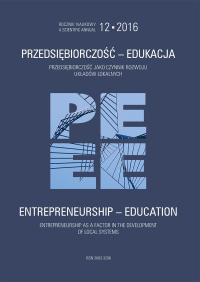Development of Entrepreneurial Attitudes with Regard to the Principles of Sustainable Development Among Pupils Using the PowerPlayer Game Developed Within the Project SUSEN
DOI:
https://doi.org/10.24917/20833296.12.33Keywords:
eco-development, educational game, energy sources, entrepreneurship education, primary school, secondary school, sustainable developmentAbstract
Entrepreneurship in the European education system is treated as a key competence, which also influences the development of other key competences for lifelong learning. Therefore, the objectives of entrepreneurship education, especially in the context of school education, are broad and do not refer only to the knowledge and skills needed to set up and conduct own business. At the same time, one of the great challenges of civilization is the implementation of strategies for sustainable development, which is why education for sustainable development is one of the main pillars of this strategy. For these particular educational challenges the European project SUSEN (“Sustainable Entrepreneurship - A Game-Based Exploration for Lower Secondary Schools”), was established and implemented by a consortium of partners from different European countries. The subject of the paper is the rationale, the basic objectives and the final products of this project, useful in entrepreneurship education and sustainability. The main aim of this article is to show the possibility and advantages of applying in practice the educational main product, which is a learning game Power Player and assess its suitability in the light of the preliminary results of the pilot project conducted in Polish schools. This is a board game for students, mostly aged between 12-15 years. This tool combines the features of a typical strategy game with elements of education. The game aims to introduce the concept of sustainable business in an attractive form for pupils of the final class of primary and lower-secondary schools (gymnasium), by making business decisions in the use of energy sources. The game thus combines traditional learning content for lessons with practical exercises, so that learning becomes more effective. The project is also supplied with the interesting case studies of economic life, showing in practice how companies combine business thinking (focused on economic efficiency) with care for the environment in the use of energy sources. Preliminary results of pilot studies in Poland indicate its attractiveness and usefulness in school practice.References
Bernatowicz, A., Rataj, Z. (2015). Wsparcie procesu dydaktycznego grami planszowymi na przykładzie gry „Społeczność w działaniu”. Studia Oeconomica Posnaniensia, 3(5), 104–119.
Bokwa, A., Jezioro, P., Wypych, S. (2005). Sustainable Development, Ecological Awareness and Geographical Education, Prace Geograficzne/Instytut Geografii i Gospodarki Przestrzennej Uniwersytetu Jagiellońskiego, 115, 59–66.
Bołtuć, M., Bołtuć P. (2004). Inne spojrzenie na nauczanie w oparciu o gry. e-mentor, 2(4). Pozyskano z: http://www.e-mentor.edu.pl/artykul/index/numer/4/id/43
Borowiec, M., Rachwał, T. (2011). Kształtowanie postaw przedsiębiorczych na lekcjach geografii wyzwaniem edukacyjnym w procesach globalizacji. Przedsiębiorczość – Edukacja, 7, 321–332.
Cewińska, J., Krasnova, A. (2014). Grywalizacja w rozwoju i edukacji – szanse i zagrożenia. Prace Naukowe Uniwersytetu Ekonomicznego we Wrocławiu, 350, 73–81.
Gaweł, A., Pietrzykowski M., (2014). The Strategic Management Virtual Game Method in Business Education, Wydawnictwo IUSatTAX, Warszawa.
Gaweł, A. (2014). Gry strategiczne w edukacji przedsiębiorczej. Horyzonty Wychowania, 13(26), 303–325.
Markowski, A., Pietralczyk, Ł. (2013). Gry ekonomiczne i ich wykorzystanie – wybrane przykłady. Prace Naukowe Młodych Ekonomistów Wyższej Szkoły Bankowej w Gdańsku, 2, 139–148.
Pivec, M., Dziabenko, O. (2004). Model gry edukacyjnej dla potrzeb kształcenia online grup studenckich. e-mentor, 2(4). Pozyskano z: http://www.e-mentor.edu.pl/artykul/index/numer/4/id/42
Rachwał, T., Kurek, S., Boguś, M. (2016). Entrepreneurship Education at Secondary Level in Transition Economies: A Case of Poland. Entrepreneurial Business and Economics Review, 4(1), 61–81. DOI: http://dx.doi.org/10.15678/EBER.2016.040105
Rozporządzenie Ministra Edukacji Narodowej z dnia 23 grudnia 2008 r. w sprawie podstawy programowej wychowania przedszkolnego oraz kształcenia ogólnego w poszczególnych typach szkół, Dz.U.z dn.15 stycznia 2009 r. rr 4, poz. 17.
Rzepka, B. (2014). Strategiczne gry planszowe. Personel i Zarządzanie, 2014(1), 72–75.
Škudienė V., 2012, Edukacja oparta na studium przypadku. W: Ph. Ammerman, A. Gaweł, M. Pietrzykowski, R. Rauktienė, T. Williamson (red.), Metoda studium przypadku w edukacji biznesowej, Warszawa: Wydawnictwo IUSatTAX.
Szmulczyńska B., 2007, E-learning – oferta edukacyjna również dla szkół. W: P. Wachowiak, M. Dąbrowski, B. Majewski (red.), Kształtowanie postaw przedsiębiorczych a edukacja ekonomiczna, Warszawa: Fundacja Promocji i Akredytacji Kierunków Ekonomicznych.
Tracz, M., Rachwał, T. (2008). Metody nauczania i środki dydaktyczne stosowane przez nauczycieli podstaw przedsiębiorczości – wyniki badań. Przedsiębiorczość – Edukacja, 4, 325–330.
Wach, K. (2013). Edukacja na rzecz przedsiębiorczości wobec współczesnych wyzwań cywilizacyjno-gospodarczych.Przedsiębiorczość – Edukacja, 9, 246–257.
Zioło, Z. (2012). Miejsce przedsiębiorczości w edukacji. Przedsiębiorczość – Edukacja, 8, 10–23.
Żur, A. (2014). Exploring the Role of Inspiration in Entrepreneurship Education. Horyzonty Wychowania, 13(26), 179–194.
Downloads
Published
How to Cite
Issue
Section
License
Articles are published under the terms of the Creative Commons License (CC BY-ND 4.0; Attribution– NoDerivs).

